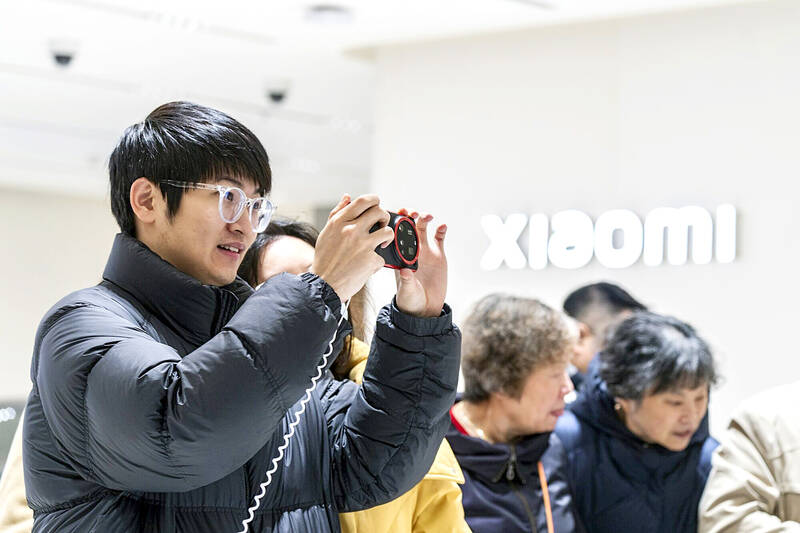Xiaomi Corp’s (小米) founder yesterday outlined plans to outfit the firm’s top-end devices with advanced homegrown mobile processors, showcasing the company’s ambitions to expand its tech portfolio and compete with US heavyweights.
Lei Jun (雷軍), who shot to fame with bold plans to unseat Apple Inc in China, gave online viewers a sneak peek at its Xring O1 chip, which he said would power three devices, including the Xiaomi Tablet 7 Ultra, another product launched at the same event, livestreamed from Beijing.
At 3 nanometers, the processor is aimed at matching Apple and Qualcomm Inc chips.

Photo: Bloomberg
“We also want to become one of the top chipmakers, with our phones targeting iPhones, can our chips also be compared against those of Apple’s?” he said.
Lei said that the Xring lags Apple’s own chipset in some respects such as processor speed, but added that it was an achievement for the Chinese company’s fledgling design team.
The entrepreneur, who often hosts product launches, was expected to trot out Xiaomi’s first electric sport utility vehicle (SUV) — the YU7 — at the same event.
Xiaomi is keen to push deeper into tech arenas beyond the affordable smartphones and appliances it is best known for.
Lei yesterday announced plans to invest 200 billion yuan (US$27.8 billion) in research and development over the next five years.
It wants to move past a fatal March incident involving one of its signature SU7 sedans that sent orders plunging the following month.
Xiaomi had raised its delivery target for electric vehicles (EV) this year to 350,000 units days before that incident, which prompted scrutiny over Xiaomi’s self-driving advertising claims.
It stoked concerns that the YU7 would be delayed.
Lei’s most important project is EVs — a US$10 billion attempt to take on Tesla Inc and BYD Co (比亞迪) that the founder has called his final endeavor as an entrepreneur.
The market for SUVs was more intense than that for sedans, Lei wrote on social media, but he believed that the YU7 has its own unique qualities.
It would not officially hit the market until at least July, with no pricing released at the event yesterday.
Xiaomi would not take pre-orders for the vehicle yet, Lei wrote in a separate social media post.
The company has also announced a US$7 billion investment to develop and enhance its own mobile processor over the next decade.
Xiaomi’s goals mirror Huawei Technologies Co’s (華為) breakthrough a few years ago, which spooked Washington and raised concerns about Chinese advances in strategic technologies such as artificial intelligence (AI) and chips.
Among the hard-tech initiatives it has touted since the March incident was an in-house large language model dubbed MiMo.
Executives have reportedly talked about investing in AI, although MiMo is the first real product to emerge.
Its foray marks the second big project in as many years for a company best-known for making affordable smartphones and appliances from robot vacuums to rice cookers.

NEW IDENTITY: Known for its software, India has expanded into hardware, with its semiconductor industry growing from US$38bn in 2023 to US$45bn to US$50bn India on Saturday inaugurated its first semiconductor assembly and test facility, a milestone in the government’s push to reduce dependence on foreign chipmakers and stake a claim in a sector dominated by China. Indian Prime Minister Narendra Modi opened US firm Micron Technology Inc’s semiconductor assembly, test and packaging unit in his home state of Gujarat, hailing the “dawn of a new era” for India’s technology ambitions. “When young Indians look back in the future, they will see this decade as the turning point in our tech future,” Modi told the event, which was broadcast on his YouTube channel. The plant would convert

‘SEISMIC SHIFT’: The researcher forecast there would be about 1.1 billion mobile shipments this year, down from 1.26 billion the prior year and erasing years of gains The global smartphone market is expected to contract 12.9 percent this year due to the unprecedented memorychip shortage, marking “a crisis like no other,” researcher International Data Corp (IDC) said. The new forecast, a dramatic revision down from earlier estimates, gives the latest accounting of the ongoing memory crunch that is affecting every corner of the electronics industry. The demand for advanced memory to power artificial intelligence (AI) tasks has drained global supply until well into next year and jeopardizes the business model of many smartphone makers. IDC forecast about 1.1 billion mobile shipments this year, down from 1.26 billion the prior

People stand in a Pokemon store in Tokyo on Thursday. One of the world highest-grossing franchises is celebrated its 30th anniversary yesterday.

Zimbabwe’s ban on raw lithium exports is forcing Chinese miners to rethink their strategy, speeding up plans to process the metal locally instead of shipping it to China’s vast rechargeable battery industry. The country is Africa’s largest lithium producer and has one of the world’s largest reserves, according to the US Geological Survey (USGS). Zimbabwe already banned the export of lithium ore in 2022 and last year announced it would halt exports of lithium concentrates from January next year. However, on Wednesday it imposed the ban with immediate effect, leaving unclear what the lithium mining sector would do in the